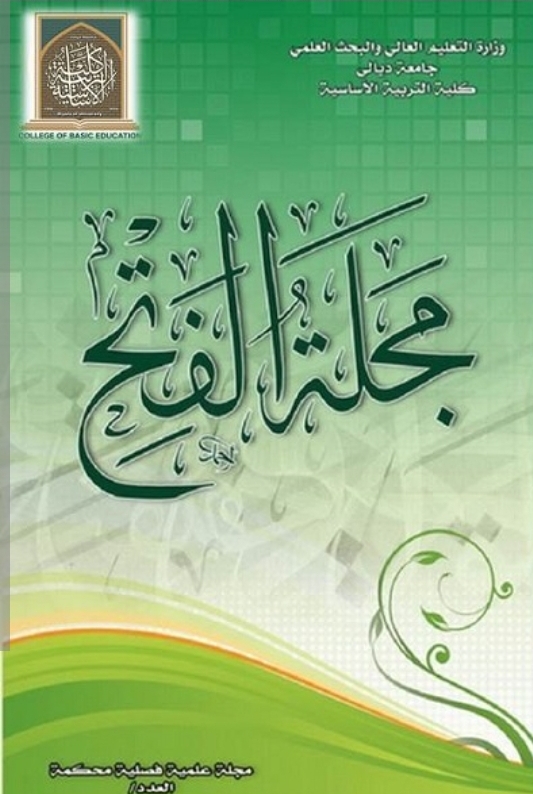Digital citizenship among university students A field study at Diyala University
Keywords:
digital citizenshipAbstract
The aim of the current research is to identify digital citizenship among university students, and the significance of statistical differences in digital citizenship according to the gender variable (male-female). The apparent validity and the validity of the structure were verified, and the reliability was verified by the re-test method, as the reliability rate was (0.82), while the reliability coefficient by the Alpha Cro-Nabach method was (0.82), and then the scale was applied to the basic research sample consisting of (400) Male and female students from the University of Diyala and from both scientific and human specializations for the morning studies. The research sample was chosen in a stratified random manner with a proportional distribution and when processing the study data statistically (t-test for one sample, Pearson's correlation coefficient, t-test for two independent samples, and the Vachronbach equation). The research sample individuals have high digital citizenship compared to the theoretical average of the scale and with significant differences, and digital citizenship is not affected by gender (males-females), as it is one for both. In light of the results, the current research came out with a number of recommendations and proposals
References
أبو جادو ,صالح محمد (2003): علم النفس التربوي , ط3 , دار المسيرة , عمان, ص)398).
أحمد، بوعبزة، أسماء، عيودة (2020). دور الجامعة في تنمية المواطنة الرقمية لدى فئة الطلبة : مجلة دراسات في علوم الانسان والمجتمع - جامعة جيجل، مجلد3،العدد3، ص 71- 84.
الشهري، د. فاطمة بنت علي (2016). تحدي الأسرة في تعزيز قيم المواطنة الرقمية (رؤية مقترحة): السعودية ، كلية العلوم الاجتماعية والادارية ، جامعة نايف العربية للعلوم الأمنية، عدد الصفحات (1- 19).
الصمادي، هند سمعان إبراهيم (2017). تصورات طلبة جامعة القصيم نحو المواطنة الرقمية وسبل تفعيلها في المؤسسات التعليمية: المملكة العربية السعودية – جامعة القصيم ، دار النشر- المجلة العربية في العلوم الإنسانية والاجتماعية، العدد 27، عدد الصفحات (1- 20).
طوالبة، هادي (3017). المواطنة الرقمية في كتب التربية الوطنية والمدينة (دراسة تحليلية): دار النشر- مجلة الاردنية في العلوم التربوية، مجلد 13،عدد 3،عدد الصفحات (291- 308).
الهادي، د. حسن عبد (2020). اشكالية تحديد الاعلانات الرقمية الملكية الرقمية عند مستخدمي الانترنيت لدى طلبة الجامعة (دراسة میدانية): كلية الاعلام - جامعة بغداد ، دار الابحاث والكتاب، ص 1- 24.
المصادر الاجنبية:
Choi, M. (2016). A concept analysis of digital citizenship for democratic citizenship education in the internet age. Theory & research in social education, 44(4), 565-607.
Kim, M., & Choi, D (2018). Development of Youth Digital Citizenship Scale and Implication for Educational Setting: Educational Technology & Society.
Ribble, M. (2015). Digital Citizenship in Schools: Nine Elements All Students Should Know (3rd ed.). Washington DC: International Society for Technology in Education.
Ribble, M., Bailey, G.,& Ross,T.W. (2004). Digital citizenship: Addressing appropriate technology behavior. Learning and Leading with Technology.
Stanely, B Hop kins, Ki(1972); Educational a Psychological measurement and Evalnation, New Jersey fPrenticetHall.
Downloads
Published
How to Cite
Issue
Section
License
Copyright (c) 2024 https://creativecommons.org/licenses/by/4.0/

This work is licensed under a Creative Commons Attribution 4.0 International License.
حقوق النشر والترخيص
تطبق مجلة الفتح للبحوث التربوية والنفسية ترخيص CC BY (ترخيص Creative Commons Attribution 4.0 International). يسمح هذا الترخيص للمؤلفين بالاحتفاظ بملكية حقوق الطبع والنشر لأوراقهم. لكن هذا الترخيص يسمح لأي مستخدم بتنزيل المقالة وطباعتها واستخراجها وإعادة استخدامها وأرشفتها وتوزيعها ، طالما تم منح الائتمان المناسب للمؤلفين ومصدر العمل. يضمن الترخيص أن المقالة ستكون متاحة على نطاق واسع بقدر الإمكان وأن المقالة يمكن تضمينها في أي أرشيف علمي.
لمزيد من المعلومات، يرجى متابعة الرابط: https://creativecommons.org/licenses/by/4.0/.


